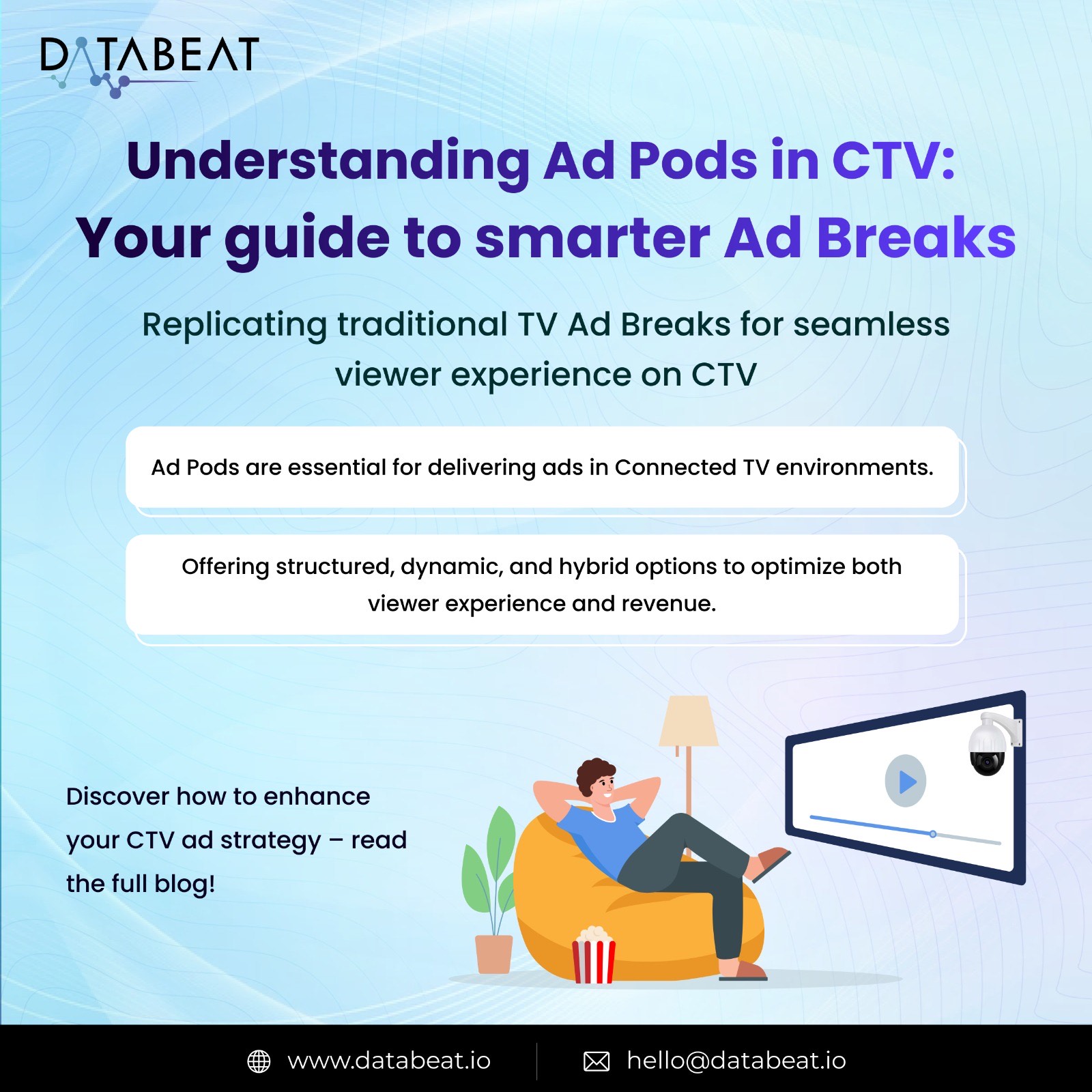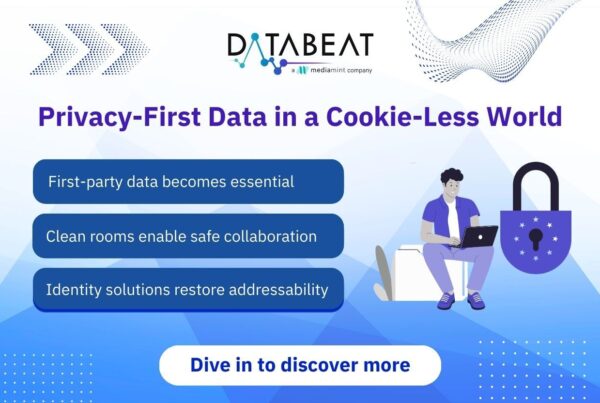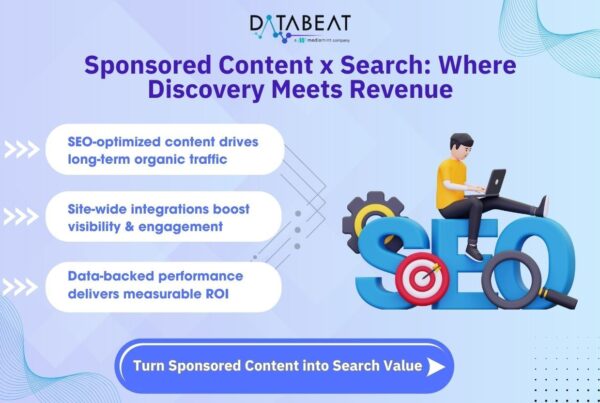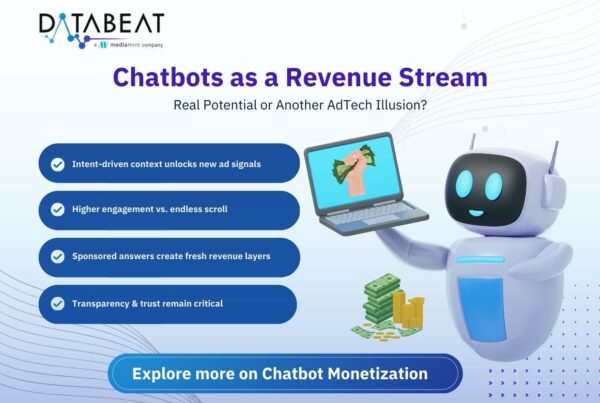
In traditional linear broadcasting, viewers are habituated to encountering ad breaks during pauses in TV shows, sports events, or other live programs. These ad breaks are integral to the overall viewing experience. In CTV to replicate the exact user experience, Ad Pods are introduced.
Ad pods are basically the series of ads that play during a single commercial break within connected TV environments. Their goal is to replicate the traditional TV ad experience, but they need to manage various factors such as duplication, competitive separation, buffering, and frequency capping to maintain a seamless viewing experience.
Types of Ad Pods
There are three types of Ad Pods that sellers can choose and implement based on their requirements, Here is an overview of each Pod types
| Pod Type | Structured Ad Pods | Dynamic Ad Pods | Hybrid |
| Description | These pods consist of a fixed number of ad breaks with predetermined lengths. Sellers can determine the exact number of ads and their durations. | In Dynamic ad pods, sellers only specify the duration of the pod, irrespective of the number of slots can accommodate | Best suited for sellers with strong, direct ad demand who prioritize a consistent and premium ad experience. |
| Best suited | If the sellers have a good amount of direct and premium demand and there is a need for consistent ad placements | Scenarios where ad demand is unpredictable or where there’s a need to optimize revenue by allowing real-time ad placements. | Situations requiring both guaranteed ad placements and flexible slots to maximize revenue. |
| example | A structured ad podding might include three 30-second ad breaks, each playing in a set order. | Within a 90-second ad break, the pod might accommodate three 30-second ads, six 15-second ads, or any combination totaling 90 seconds. | A 90-second pod may have a dynamic first minute, with a fixed 30-second ad break completing the pod. |
Which Ad Pod Strategy Works Best?
The choice of ad pod strategy depends on the media owner’s goals, ad demand, and the nature of the content.
- Structured Ad Pods: Best suited for sellers with strong, direct ad demand who prioritize a consistent and premium ad experience.
- Dynamic Ad Pods: Ideal for sellers with unpredictable ad demand, offering flexibility and maximizing revenue based on real-time ad placements.
- Hybrid Ad Pods: Provide the perfect balance for scenarios requiring both structured and flexible ad slots.
Key Metrics for Ad Pod Optimization
Effectively managing ad podding requires tracking performance through specific metrics tailored to the pod type:
Metrics for Structured Ad Pods
- Slot-Level Metrics:
- Pod Slot Requests: The number of slot requests sent.
- Pod Slot Responses: The responses received for those requests.
- Pod Slot Filled: The number of ads successfully played in a slot.
- Fill Rate:
- Calculated as:
Fill Rate= Pods Slots Filled/ Pod Slots Requested
- Slot Request CPM:
- Calculated as
Slot Request CPM = (Cost/ Pods Slots Requested ) x 1000
Metrics for Dynamic Ad Pods
- Time-Based Metrics:
- Pod Time Requested: Total time requested for ads.
- Pod Time Responses: Total time for which ad responses were received.
- Pod Time Filled: Total time of ads that were successfully played.
- Fill Rate:
- Calculated as
Fill Rate = Pod Time Filled / Pod Time Requested
- Cost per 10,000 Seconds Requested:
- Calculated as
Cost per 10,000 seconds requested = (Cost/ Pods Time Requested) x 100
Optimal Podding Strategies
For effective podding, sellers should implement strategies specific to each ad pod type:
| Structured Ad Pod | Dynamic Ad Pod | |
| Frequency of the POD | Every 8 minutes of video content | Every 8 minutes of video content |
| Length of the POD | Maximum 4 slots of 30 seconds in a pod | 90 seconds |
Conclusion
The way that individuals watch video content and how advertisers reach their target audiences has changed significantly as a result of connected TV. Pods are the important technique that sellers can implement to improve the ad experience as well as maximize their revenue. Pods are simply created to replicate the traditional TV experience on CTV, and it is yielding wonderful results. Its sellers choice to setup the type of ad pod based on their requirements.
How Databeat Can Help You
At Databeat, we are experts at maximizing the CTV ad ecosystem to provide clients with better outcomes. Our experts are skilled at creating CTV-specific solutions. We have experience resolving issues with many publications, and we can guarantee data-driven, efficient tactics to help you get the most out of your advertising investment.









